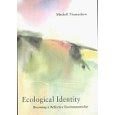
Eleven years ago (1997) I attended a conference on biodiversity at the National Academy of Sciences in Washington. I was reminded of what I had already known—the earth is the early stages of the sixth megaextinction, the catastrophic breakdown of biodiversity. Indeed, this prompted me to write a book, Bringing the Biosphere Home—Learning to Perceive Global Environmental Change (MIT Press, 2001) which essentially is about how to educate for biodiversity and climate change.
Several weeks ago the National Council for Science and the Environment held its annual conference in Washington. This year's topic was biodiversity. Attending the conference allowed me to reflect on the last decade. You already know the news! World economic development, the continued emphasis on petroleum products, and the extraordinary growth in the Chinese and Indian economies have accelerated biodiversity loss at an unimagined pace.
As discouraging and depressing as this is, for the first time in recent memory, there is actually a great deal of hope in Washington. Why? The Obama team has assembled a science team that is knowledgeable, committed, and completely understands the severity of the biodiversity crisis.
Jane Lubchenco a Professor at Oregon State University (who holds an Honorary doctorate from Unity College!), the new NASA director, is a marine biologist who has long been an advocate of biodiversity initiatives.
Check out her website http://lucile.science.oregonstate.edu/lubchenco/
Johm Holdren, A Professor of Earth and Planetary Sciences at Harvard University and the President and Director of the Woods Hole Research Center, will lead the White House Office of Science and Technology Policy. He delivered a riveting lecture at the Eighth NCSE conference called "Meeting the Climate-Change Challenge."
Check out his website http://www.hks.harvard.edu/about/faculty-staff-directory/john-holdren
Steven Chu, the new Secretary of Energy, directs the Lawrence Berkeley National Laboratory. He is a long-time advocate of alternative energy development, and a Nobel Prize winning physics Professor.
Learn more about him here: http://www.lbl.gov/Publications/Director/
This is an absolutely extraordinary team and we have high hopes for what they might accomplish. Additionally, the Obama transition team has met repeatedly with some of the nation's foremost ecologists, environmental scientists, climate change experts, and biodiversity advocates. There is a great deal of hope and confidence that the forthcoming administration actually understands and cares about these challenges.
What does this mean for higher education generally and Unity College specifically? It lends greater meaning to our own efforts to revitalize our curriculum. We must prepare our students to (1) understand the dimensions of the climate change and biodiversity crises (2) develop the expertise to pursue meaningful and pertinent careers (3) take active roles as proponents of environmental awareness. Our students can now pursue their studies knowing that there will be hope, initiative, and support for their efforts. What a difference that makes as they embark on their careers. They must also understand that they face a daunting challenge. But it will be much easier for them to do so knowing that there will be support for their efforts.
I cannot think of anything more urgent for our nation's college students then to get mobilized and educated on behalf of preserving biodiversity and mitigating climate change. All of the recent emphasis on sustainability and a green economy is magnificent. Yet we must remember that these are responses to a bigger challenge. If a green economy lacks an ecological ethic then it will merely be a passing trend, a superficial way to get people back to work rebuilding a failing infrastructure. That's important! But it won't be enduring or resilient if it lacks the requisite environmental awareness.
At Unity College the best way we can support the new administration is to train a new generation of environmental leaders who will not only help create the foundation of a green economy, but will do so with preserving biodiversity in mind. That is at the heart of our curricular challenge.




